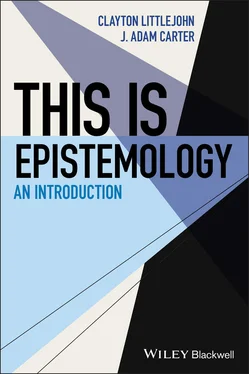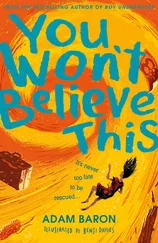1.58We didn't need perceptual beliefs to make the point. The point could have been made equally well using introspective beliefs, the beliefs you form straight off about your own mental life. And, indeed, such an introspective example is offered by Ernest Sosa, in his famous paper “The Raft and the Pyramid” (1980). Consider this passage, in which Sosa poses the following thought experiment:
Thus take my belief that I have a headache when I do have a splitting headache, and let us suppose that this does cohere within my present body of beliefs … such a belief may well have relevant relations of explanation, logic, or probability with at most a small set of other beliefs of mine at the time: say, that I am not free of headache, that I am in pain, that someone is in pain, and the like. If so, then an equally coherent alternative is not far to seek. Let everything remain constant, including the splitting headache, except for the following: replace the belief that I have a headache with the belief that I do not have a headache, the belief that I am in pain with the belief that I am not in pain, the belief that someone is in pain with the belief that someone is not in pain, and so on. I contend that my resulting hypothetical system of beliefs would cohere as fully as does my actual system of beliefs, and yet my hypothetical belief that I do not have a headache would not therefore be justified . What makes this difference concerning justification between my actual belief that I have a headache and the hypothetical belief that I am free of headache, each as coherent as the other within its own system, if not the actual splitting headache? But the headache is not itself a belief nor a relation among beliefs and is thus in no way constitutive of the internal coherence of my body of beliefs. (1980, p. 19, italics added)
1.59Sosa's thought experiment offers reason to doubt that the justification for introspective beliefs such as that you have a headache right now derives from facts about how your beliefs are related to one another. This is all thse more reason to see why the Isolation Objection is a pressing one in light of the coherentist's claim that the only relevant difference between justified and unjustified beliefs is how well they cohere with the rest of the believer's beliefs.
1.60The intuition that underwrites the Isolation Objection is related to another influential objection to coherentism. Some of the clearest cases of irrational belief are cases in which someone is caught in the grips of delusion or subject to brainwashing. It doesn't matter whether our example involves a cult member brainwashed into believing that billions of years ago rational beings navigated the universe in spaceships that looked very similar to the cars of the 1950s or whether our example involves someone who firmly believes that their loved ones have been replaced by impostors. 31 While the beliefs of such believers seem to be paradigmatic cases of irrational belief, it doesn't seem that we can account for the irrationality of such beliefs in terms of considerations of coherence. We want to say that our beliefs are rational, theirs are not, and that it's clear that there's a significant normative difference between them, but this difference cannot be traced to something like a degree of coherence that our beliefs display that theirs lack or the presence of incoherence that their beliefs display that ours do not. Part of what's so disturbing about subjects like this, subjects we'd describe as “having lost touch with reality,” is that their beliefs are often chillingly coherent. The most salient difference between our beliefs and theirs is that our beliefs are tethered to reality because they are properly responsive to new experiences. Unfortunately for the coherentists, they cannot straightforwardly accommodate this point, as they see justification as having all to do with relations between beliefs. 32
1.61The infinitists and coherentists try to account for the possibility of justified belief in terms of the rational support provided by more justified beliefs. On this view, the justification for any justified belief is derivative in the sense that it derives the necessary rational support from further justified beliefs. The coherentists and infinitists disagree about how supporting beliefs have to be structured to ensure that justified beliefs are justified, but they agree that stopping the justificatory regress doesn't involve any belief that (i) can justify further beliefs and that (ii) does not derive its justification from any further belief. These beliefs, which have been called properly basic , foundational , non‐inferentially justified , and immediately justified beliefs, are, according to the foundationalist, epistemically essential. Without them, none of our beliefs could be justified.
1.62Foundationalists would say that we should modify the Supporting Justified Belief Rule to allow for properly basic beliefs:
Supporting Justified Belief or Non‐Doxastic Justifier Rule : an entry in Your Book of Beliefs gets to be an entry in Your Book of Justified Beliefs iff it is adequately supported by more justified beliefs or something else .
1.63As the foundationalist sees things, every justified belief will either derive its justification from a set of justified beliefs that provide adequate support or derive its justification from something else. The foundationalists will disagree among themselves about what this something else might be. The crucial points are these:
First, all justification will ultimately derive from something outside of the circle of belief. This justification will then flow “upwards” from the non‐inferential beliefs to other beliefs through inference.
Second, this source of justification can sometimes provide all the justification needed for a belief.
1.64If we're going to settle the debate between the infinitists, coherentists, and foundationalists, we'll have to settle the question as to whether there can be properly basic beliefs. Let's look at two arguments for foundationalism before turning to objections.
1.65Perhaps the most influential argument for foundationalism is the Regress Argument for Foundationalism : 33
Regress Argument for Foundationalism
P1.There are some justified beliefs.
P2.If there are some justified beliefs, either some of these beliefs are justified without requiring support from further beliefs or they are all justified only because of the support provided by further justified beliefs.
C1.Either some of the justified beliefs are justified without requiring support from further beliefs or they are all justified only because of the support provided by further justified beliefs.
P3.If all of the justified beliefs are justified only because of the support provided by further justified beliefs, the set of required supporting beliefs will either form a circle or extend back infinitely.
P4.Neither circular structures of justificatory support nor infinite chains of justified beliefs can provide the support required for a belief to be justified.
C2.So, not all of the justified beliefs are justified only because of the support provided by further justified beliefs.
C3.So, some justified beliefs are justified without requiring support from further beliefs.
1.66The basic argumentative strategy is simple. We list the three possible non‐skeptical responses to the regress argument (i.e. infinitism, coherentism, and foundationalism). On the assumption that the objections to infinitism and coherentism outlined above are decisive, we conclude that the remaining view that hasn't been eliminated must be the right one. The objections discussed above are supposed to provide the support for P4.
Читать дальше












